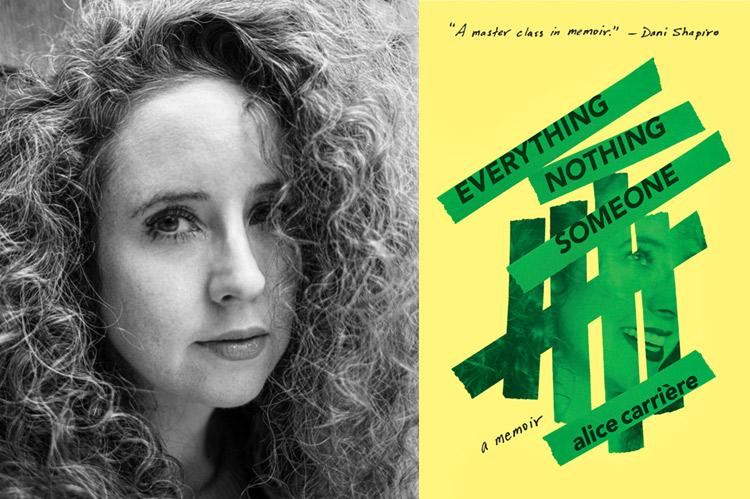“Everything/Nothing/Someone”
Alice Carriere
Spiegel & Grau, $28
Seated behind a stack of books at the Authors Night fund-raiser in East Hampton in August, Alice Carriere said her memoir, "Everything/Nothing/Someone," was about a disconnect, her inability to recognize her own face in a mirror. Odd and intriguing, the dissociative disorder seemed a mild consequence, I thought after reading this intense, disturbing book about the devastating toll of parental neglect, especially when Mom is the famed painter Jennifer Bartlett, who died last year in Amagansett, and Dad is Mathieu Carriere, a handsome, roguish German actor well known in Europe.
As she tells it, Ms. Carriere's childhood was more dreamy than Dickensian: a Greenwich Village home fitted with a pool, private schools, fine clothes and toys, a devoted nanny. Her penchant for words lifts this dark story from fodder for self-help magazines to a fully realized literary experience. No wonder Marie Brenner, the Vanity Fair writer and memoirist, seated to the right of Ms. Carriere at Authors Night, behind her own stack, enthused about this book. The generosity was not just pushing a younger writer forward.
Memoirs, by definition, are subjective, facts filtered through an individual distorted sensibility. In the finest, as in fiction, the protagonist grows and changes, learning in the process how to overcome challenges. Retitling, you could call this arc "how to become the hero of your life."
In "Everything" the bare-bones formula is embellished with graphic accounts of self-abuse, cutting, for example, and a blitz of pharmaceuticals — mostly legal and administered by some shady health professionals in "Cuckoo's Nest" institutions.
In one scene featuring her father, she feels trapped following a disagreement: "My heart smacked against my rib cage, my thoughts thrashed at my brain. I grabbed one of my orange pill bottles and swallowed five Klonopin. I grabbed another brown glass beer bottle and drained it. . . . I ran into the bathroom and locked the door behind me. I dismantled a razor blade, wedged myself between the closet and the washing machine, and began slicing up my left forearm."
After begging her to open the door, her father called Bartlett, in Amagansett at the time, who sent over a trusted friend to clot and bandage.
Posited this way, with a child so damaged, villains must be held accountable.
Drawn in, I wondered how the mother could handle all this drama from afar, and remembering this was a child's perspective all along, at times I wanted to shake Bartlett into proper response; I wanted to have a talk with her younger self, to ask what a sensible Bartlett was thinking, so self-absorbed, just as the nanny, by virtue of her station, simply could not.
Then I wanted to shake Ms. Carriere, what was she thinking, but she beat me to resolution. She achieves her rapprochement with this distant, alcoholic mother after age has eroded the sharp edges to a softened version of herself, when, as these things happen, the daughter takes the reins.
A brave confrontation with Dad, from whom she'd been estranged, also yields rewards, bringing into focus harsh, insensitive divorce law logic. An adored figure, and artsy provocateur, he was the object of her fantasies, having urged many a transgression, such as just before she turned adult: " 'We should do naked photos while you're still a Lolita,' my father suggested."
His image too is redrawn as she gets her life in order. Yet "Underneath all these moments still bounced my medications, the amphetamine altitudes and depressant depressions leaving me unable to find secure footing, and the hulk of my new identity — molested survivor repressing memories — heaved beneath the delicate skin of my new life."
Smart and determined, Ms. Carriere learns to love herself, sweet and clichéd as it sounds, the ultimate journey of this book. And how she gets there is inspirational. She's aided by the nanny's diary, which sets right Ms. Carriere's childhood perceptions of questionable parenting, validating her experience and also confirming the healing power of language, her chosen medium after a coming-of-age with artists.
Following a bunch of sketchy, drug-addled boyfriends, she finds Gregory, now her husband, a charmingly flawed man who understands her and, in the current parlance, truly sees her.
To the writer's credit, we get to see her too.
Regina Weinreich is the author of "Kerouac's Spontaneous Poetics," editor of his "Book of Haikus," and co-producer/director of the documentary "Paul Bowles: The Complete Outsider." She lives in Manhattan and Montauk.
Alice Carriere lives part time in Amagansett.

